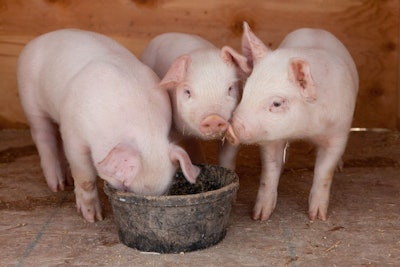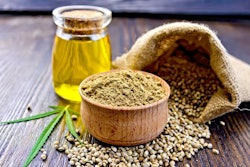
Lack of key vitamins in swine production may prompt reliance on antibiotics, professor says
While new and novel feed ingredients may help to boost gut health, managing key vitamins could go a long way toward reducing use of antibiotics in swine production, according to a Danish professor.
Research on the topic in swine specifically is still limited, but human nutritionists increasingly understand that a handful of oft-neglected vitamins play an important role in the immune system, according to Charlotte Lauridsen, a professor of animal science at Aarhus University. Like many emerging antibiotic alternatives, vitamins E, C, D and a host of B vitamins help to maintain gut health in swine. In a recent paper in the journal Animal Feed Science and Technology, Lauridsen argues they could prove important to preventing antibiotic resistance.
In swine, Lauridsen explains, the vast majority of antibiotics are used to treat enteric gut infections that occur in the post-weaning phase—and this could be directly linked to advances in modern pig production. Laridsen noted that today’s sows have larger litters than in the past, and that piglets initially rely on these sows for their nutritional needs. Dietary guidelines established for the smaller litters of the past may provide insufficient nutrition for piglets from larger litters, Laridsen said.
If the piglets enter the post-weaning phase deficient in vitamins that fight inflammation and oxidative stress, then this lack of nutrition could kick off a downward spiral resulting in more severe gut infections, Laridsen continued. Anti-oxidant vitamins such as vitamin E counteract the oxidative stress that is caused by bacteria such as e. coli. This stress causes damage to the intestine which, in turn, prevents the piglet from absorbing nutrients from its food and causes the diarrhea that typically triggers treatment with antibiotics. The lack of absorption, Laridsen said, also exacerbates nutritional deficiencies and further compromises the piglet’s ability to fight infection.
“At weaning, it’s too late,” she said. “At weaning, we have problems like, the piglet will sometimes not eat. That’s why I think it’s important to emphasize vitamin nutrition before the piglets are weaned.”
Another area of interest that requires further study, Laridsen said, is the role of vitamin D in gut health. Nutritionists have traditionally associated vitamin D with bone health, Laridsen said, but there is an emerging body of evidence that vitamin D is critical to immune and digestive health — at least in humans. If this holds true in pigs, Laridsen said, then vitamin D deficiencies may also help explain the prevalence of post-weaning diarrhea in piglets.
Vitamin D is primarily manufactured by animals when the skin is exposed to sunlight. Because the majority of swine are housed indoors and do not have direct exposure to sunlight, they’ve become entirely reliant on their diets for vitamin D. But vitamin D is not absorbed well by the digestive system, which means vitamin D deficiencies could be quite prevalent among animals raised indoors, Laridsen said.
Like any strategy, Laridsen said, vitamins aren’t going to be a silver bullet that eliminates the need for antibiotics or other antibiotic replacement strategies. However, based on the growing understanding of the role of vitamins in immune health, Laridsen said she believes increased attention to the presence of vitamin deficiencies is warranted in production settings and future research.
“A lot of research money is being invested” in product development, she said. “We need to turn that upside down and gain more fundamental knowledge in relation to gut health and gut function.”














